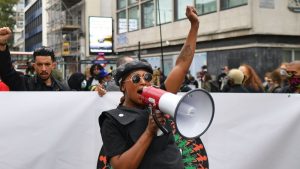
IVAW fully supports National Occupy for Prisoners Day
If you are a veteran of Iraq or Afghanistan, you are approximately 940% more likely than a civilian to be a prisoner in the United States. The total number of military veterans currently incarcerated is estimated to be around 1 million.
Maintaining an ‘all-volunteer’ fighting force and not employing a draft during over a decade of multi-front, multi-national wars has severely strained the ability of the US military to maintain a fighting presence in Iraq and Afghanistan. Military members frequently redeploy to combat zones after suffering physical and emotional trauma which, during earlier conflicts, would have made them unfit to return to the battlefield, simply because there is no one to take their place. This is largely accomplished through the recent military policy of issuing psychiatric medications–anti depressants, sleeping pills, and anti-psychotics–on a mass scale.
Before the Iraq war, American soldiers in combat zones did not take psychiatric medications, but by the time of the surge more than 20,000 U.S. troops in Afghanistan and Iraq were taking antidepressants and sleeping pills. Medicating traumatized troops keeps many of them functional enough to carry out combat missions in the mountains of Afghanistan or the cities of Iraq, but after multiple deployments, it can work to make transition to civilian life nearly impossible.
PTSD Increases the likelihood of going to Jail
The behaviors that can mean the difference between life and death on a battlefield can mean the difference between freedom and imprisonment when the soldier returns home. Often, learned military skills and tactics that enhance survival in combat, such as hyper-vigilance and rapid response to threatening encounters, may translate to aggressiveness and impulsivity, which can then lead to increased potential for arrest and incarceration in civilian society.
According to USA Today: “since the Iraq and Afghanistan wars began, 211,819 combat veterans have been treated by the VA for post-traumatic stress disorder (PTSD), about 16% of the 1.3 million who fought. But the VA says it sees only about half of veterans from the two wars, because half of the veterans seek care elsewhere or not at all”. Many mental health providers estimate the true percentage of Iraq and Afghanistan veterans with PTSD to be around 35%.
40% of veterans who show symptoms of PTSD have been charged with crimes in the period after their wartime service–the majority designated as violent crimes.
A study linking Post Traumatic Stress Disorder to violence and imprisonment found that without adequate care, prisoners with PTSD will return to their communities and likely engage in the same behavior that led to their initial imprisonment.
The War Is Not Over
U.S. Imperialism destroys lives. In addition to the hundreds of thousands of deaths caused by the U.S.-led invasions of Iraq and Afghanistan, the hundreds of thousands more related to attacks on infrastructure such as water systems and hospitals in those countries, and the generations of trauma and instability war leaves in its wake, war also has a devastating impact on soldiers sent to do the killing and dying. Wars abroad are directly connected to the war at home.
Many people recruited into the military, especially people of color, are pulled from low income communities and suffer most intensely from economic inequity, racism, lack of access to meaningful work, good schools, decent housing, and reliable health care. They are also from the communities most negatively impacted by the violence of U.S. law enforcement and imprisonment. Indeed, we see more and more veterans returning home not to the good jobs, free education, or the veneration they were promised–but to debilitating mental and physical health problems, poverty, and prison cells.
Furthermore, some of the same weapons (guns, helicopters, armored vehicles, surveillance technology), tactics (no knock entry, kettling, aerial surveillance) and players (Haliburton, Raytheon, Kroll) employed to wage foreign wars are also used to surveil, police, and imprison our most vulnerable communities at home as well.
By more fully understanding the connections between war, economic and social devastation, and the prison industrial complex, we can find ourselves better equipped and stronger to fight for a better world, at home and abroad.
The War Machine Targets Poor People and People of Color
According to a 2007 Associated Press analysis, “nearly three-fourths of [U.S. troops] killed IN Iraq came from towns where the per centage of people living in poverty topped the national average.”
In 2004, 71% of Black recruits, 65% of Latino, and 58% of white recruits came from low income communities. For Black veterans aged 18 to 24, the unemployment rate is 48%. Black people are also overrepresented in the armed services, and Latino recruitment has risen 30% in the last decade.
According to the ACLU, “In 2005, the Department of Defense commissioned two training sessions for its recruiters on how to market military careers to Latinos and African-Americans in particular. PowerPoint training materials obtained from the Department of Defense website shows that training materials based recruitment efforts around stereotypes of Latino and African American youth, including adapting language ot mimic ‘hip hop culture’ and and to appeal to ‘hotheaded’ Latino culture”.
Iraq Veterans Against the War Bay Area Fully Endorses And Supports the Feb 20 National Day of Support for Prisoners.
Too often, psychologically and physically injured service members are forced back into combat or made to train in situations that re-traumatize them. IVAW believes that individuals suffering from trauma have a right to remove themselves from the source of the trauma. Service members who are not physically or mentally healthy shall not be forced to deploy or continue service.
Operation Recovery will support service members by standing up for their right to heal from Post Traumatic Stress Disorder, Traumatic Brain Injury, Military Sexual Trauma, and combat stress. We will expose those responsible for the deployment of traumatized troops, and we will stand up against those responsible for violating them. We will end the wars by winning our Right to Heal.
To learn more about Operation Recovery and to sign a pledge to support the campaign, visit Iraq Veterans Against the War Bay Area’s website.
For more information, here is a paper outlining some of the issues facing Iraq and Afghanistan Veterans in the justice system today.








